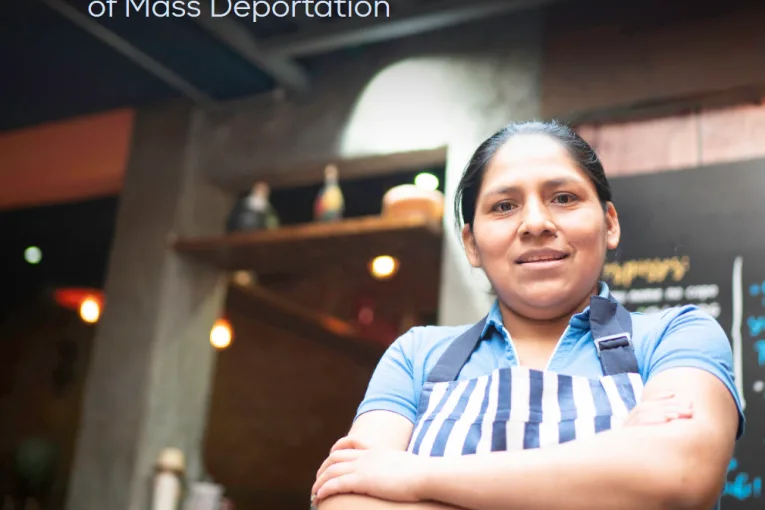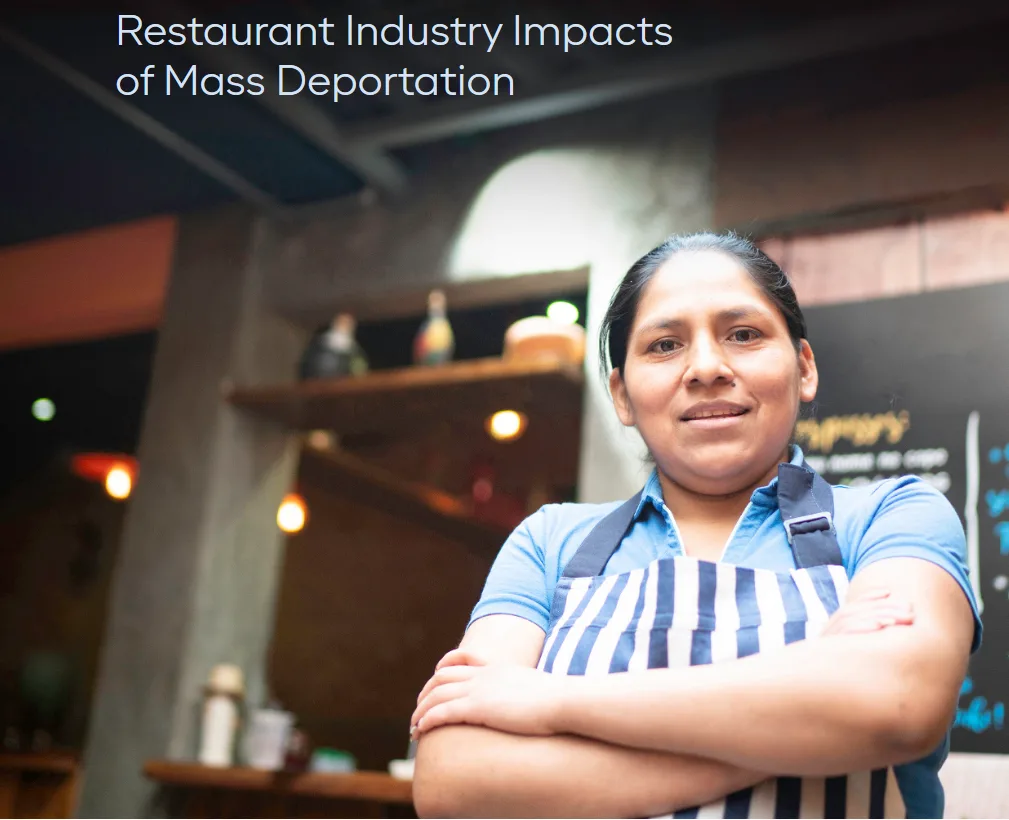
“Every deportation is a pink slip for an American restaurant. The industry depends on immigrants – from dishwashers to chefs to owners – and without them, it collapses.” – Saru Jayaraman, President of One Fair Wage and Director of the UC Berkeley Food Labor Research Center.
NEW YORK, NY — On National Immigrants Day, the UC Berkeley Food Labor Research Center and One Fair Wage released a new report warning that Donald Trump’s deportation campaign is not only tearing families apart but also gutting one of America’s most important industries: restaurants.
The report, An Industry of Immigrants: Restaurant Industry Impacts of Mass Deportation, details the economic and human consequences of the Trump administration’s deportation policies, finding that the loss of immigrant labor is driving restaurant closures, staff shortages, rising prices, and a shrinking economy nationwide.
According to the report, immigrants make up 22 percent of all restaurant workers in the U.S., including 46 percent of chefs and 18 percent of waitstaff. In many cities, the proportions are far higher — with more than half of all restaurant workers in Washington, D.C., and New York City identifying as foreign-born.
The UC Berkeley–One Fair Wage analysis found that since Trump’s return to office, 1.7 million foreign-born workers have fled or been forced out of the country between March and July 2025 — a 5 percent decline in the foreign-born labor force. That exodus has caused the overall U.S. workforce to contract by nearly 800,000 workers, marking the first major labor force decline in years.
Applied to the restaurant industry, that loss translates into approximately 137,000 fewer immigrant restaurant workers in just four months, with projections showing the industry could lose as many as 310,000 by the end of the year.
“Mass deportations are a form of economic sabotage,” said Saru Jayaraman, President of One Fair Wage and Director of the UC Berkeley Food Labor Research Center. “Every deportation is a pink slip for an American restaurant. The industry depends on immigrants — from dishwashers to chefs to owners — and without them, it collapses.”
City-level data show the localized effects of this national crisis. In New York City, roughly 4,800 foreign-born restaurant workers have fled the country since March. The Mayor’s Office of Immigrant Affairs reports that 60 percent of the city’s restaurant and food service workforce is foreign-born, and one in five is undocumented — meaning tens of thousands live under threat of deportation.
In Chicago, where nearly half of all restaurant workers are foreign-born, an estimated 2,257 workers have left since March. And in Washington, D.C., about 800 foreign-born restaurant workers have left the country, accounting for nearly all of the city’s restaurant workforce decline during that same period.
The report draws on federal labor statistics and independent research to argue that deportation policies are harming the entire U.S. economy, not just immigrant communities. A 2024 SSRN literature review cited in the report concluded that mass deportations “shrink the U.S. economy, cause American workers to lose jobs, reduce wages for U.S. citizens, and worsen the finances of federal, state, and local governments.”
In addition to workers, the report notes that immigrants are critical business owners. More than one-third of all restaurant owners are foreign-born — 36 percent compared to 19 percent across other industries. Among Asian restaurant owners, that number rises to 89 percent; among Hispanic owners, 66 percent.
These entrepreneurs not only sustain local economies but also serve as cultural bridges, creating spaces where communities gather and share meals that reflect America’s diversity. The report highlights Maria and Lou Gonzalez, owners of Bistro Casa Azul in Harlem, whose restaurant has become a neighborhood mainstay known for its warm hospitality, authentic Mexican cuisine, and fair labor practices.
Since taking office, Trump has escalated immigration raids and revoked protections for immigrants from countries including Venezuela, Cuba, and Haiti. The report notes that these measures have intensified fear among workers, disrupted supply chains, and contributed to the largest outflow of immigrant labor in decades. According to Axios, immigration is down by one-third compared to the final months of 2024.
“The restaurant industry is the Ellis Island of the modern economy — and it’s under siege,” Jayaraman said. “Trump’s policies are creating fear, instability, and chaos for millions of families and the businesses that employ them. We should be raising wages and protecting immigrant workers, not driving them out.”
The report concludes that the restaurant industry cannot recover — and the U.S. economy cannot grow — without the labor, creativity, and entrepreneurship of immigrant workers. It calls on restaurant owners, policymakers, and worker advocates to unite in raising wages, ending deportations, and ensuring basic rights and protections for all workers.
“Donald Trump’s xenophobic attack on immigrants is harming the U.S. economy,” the report states. “For the restaurant industry, this attack will have catastrophic effects. The industry could be devastated by not only the general economic decline mass deportations create, but also by an extreme labor shortage that U.S. population growth is unable to fill”.
Follow the Vanguard on Social Media – X, Instagram and Facebook. Subscribe the Vanguard News letters. To make a tax-deductible donation, please visit davisvanguard.org/donate or give directly through ActBlue. Your support will ensure that the vital work of the Vanguard continues.
Categories: Breaking News Immigration Immigration National Issues State of California Tags: Deportation Immigrant communities Immigration One Fair Wage Restaurant industry Saru Jayaraman uc Berkeley

